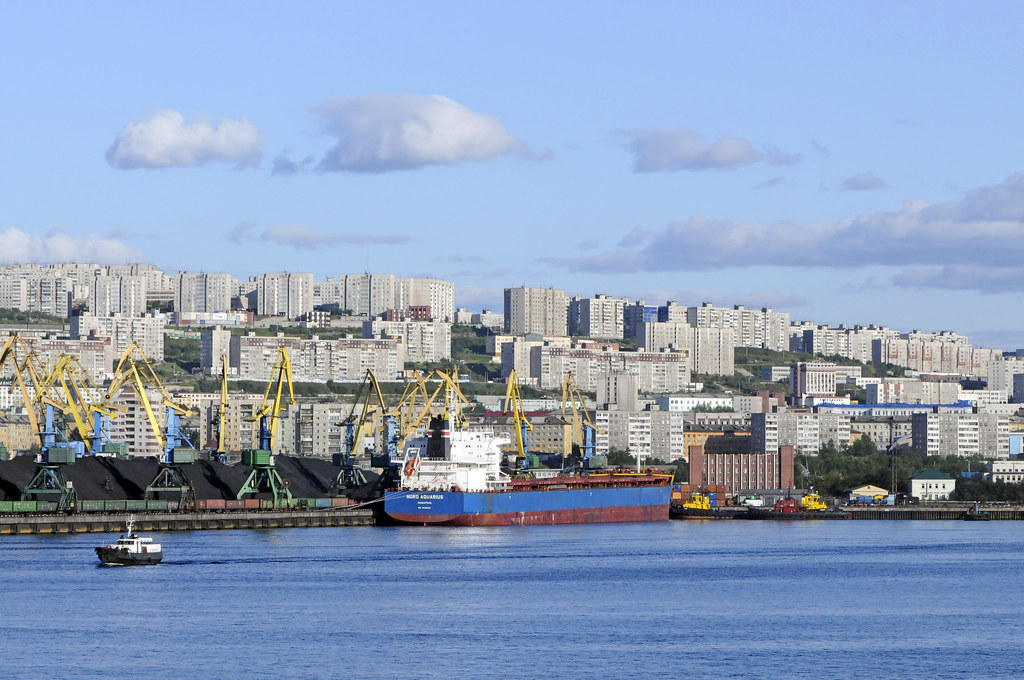- Jul 1, 2018
- 2,318

A sharp wind rolled in from the Barents Sea as the crew gathered at Pier 9 in Murmansk Port, stamping their boots on the concrete to keep warm. The sky was low and grey, casting a dull light over the cranes, shipping containers, and rusting fuel tanks. The dock’s loudspeakers crackled faintly as a small tugboat eased its strange cargo into view, the Polaris-7, long thought lost somewhere in the Arctic ice.
The men stood silently, watching.
"That’s her? Looks like hell dragged it up itself," muttered Pavel, pulling his wool hat lower against the cold.
“Forty years frozen in the north,” grunted Viktor Makarov, the foreman. “Still floats. Tougher than all of us.” He sipped from his thermos, not taking his eyes off the derelict vessel. "Keep your gloves on. No stupid risks. Strip what we need and get out."
The ship was a dark, hunched shadow against the sky. Faint letters, ПОЛЯРИС-7 peeled across its bow. The paint was blistered from salt and time, and the hull bore strange streaks of brown and grey. When the gangplank clattered down onto the dock, no one moved for a moment.
Then Viktor waved them forward.
Inside, the air was still and stale, laced with the sharp tang of old steel and damp insulation. Frost crackled under their boots. Their headlamps cut yellow cones through the dim corridors, revealing long-forgotten papers plastered to bulkheads, open hatches, shattered light fixtures.
"Stinks like something died in here," Sergei muttered, pulling a crowbar from his belt. “Probably rats.”
They started in the galley, hauling out rusted metal, loose wiring, broken appliances, then moved down toward the engineering compartments. Every door they forced open released a little storm of dust and brittle ice crystals. One of the sealed storage rooms had collapsed shelves lined with old scientific equipment, glass tubes, vacuum-sealed sample containers long cracked by frost.
“God, look at this,” Pavel said, lifting a corroded metal clipboard from the floor. The paper flaked to dust between his gloved fingers.
“Don’t touch anything weird,” Viktor warned. "We want metal, copper, usable gear. Not Soviet junk."
The forward lab was the strangest part, blackened panels, scorched countertops, and the remains of what had once been a containment station. A rack of biohazard suits slumped in one corner, plastic faceplates collapsed inward with age. One of the crew made a joke about Cold War germs, but it earned him only silence.
By noon, sweat gathered under their coats despite the cold air. The men coughed now and then, dry little hacks they blamed on the dust and frost. Nobody thought twice. They stripped yards of copper wiring, pulled loose steel plating, wrestled out old communication gear and sealed canisters marked with faded Cyrillic labels. Sealed crates were forced open, contents roughly sorted: instruments, lab glass, sealed metal tins.
"These’ll fetch something in the scrapyard," Sergei muttered, tossing a tangle of cables into a sack.
Hours passed.
No gloves were changed. No masks worn. Jackets were unzipped as the men worked harder, breathing deeper, sweating under their clothes in the frozen stillness of the ship’s gut. Each thud and creak of their boots stirred more frozen dust, fine, ancient particles, unseen and light as air, disturbed after many years of silence.
By late afternoon the first truck was full, loaded with stripped wiring, bent piping, and assorted salvage. Another load waited by the gangplank, crates piled high. The men stretched their backs, wiping damp faces with dusty sleeves.
“Easy rubles,” Pavel grinned, coughing into his glove. “Ghost ship’s not so scary after all.”
Sergei chuckled hoarsely, rubbing his throat. "Dry air is killing me."
Viktor said nothing, pulling on a cigarette as he stared back at the ship. Something about the silence unsettled him the way the ship’s old bulk seemed to crouch against the sky, still holding its secrets.
But there was no time for nerves. The work was done.
As the crew climbed into their trucks, boots clanging on metal, there was more quiet coughing, Pavel, Sergei, even old Mikhail in the driver’s seat clearing his throat over and over. But no one stayed home that night. In Murmansk, dockworkers didn’t skip shifts for coughs or a sore back. They would be back tomorrow, same time, same place.
It was just dust. Cold air. Old metal.
That’s what they told themselves.
For now.



